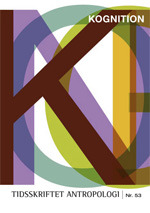DRØMME, ÅNDER OG KOGNITION
DOI:
https://doi.org/10.7146/ta.v0i53.106726Abstract
As a child of the Western intellectual tradition, anthropology has tended not to take its
informants’ stories about the existence of spiritual beings seriously. Instead, these stories
tend to be accounted for by using a terminology drawn from the theories of representation,
which take as their premise that we do not have any direct perceptual access to the
world, but need to construct it in our minds by means of our language. This article aims
at developing a radically different approach to the study of indigenous spiritual knowledge.
It draws on insights from the cognitive sciences, which show that concepts can and do
exist independently of language and that dreaming shares basic cognitive processes
with waking life. It concludes that it is possible that children can develop prototypical
concepts about spirits before they develop language. In this case language would not
be fundamental for conceptual thought about spiritual beings.
Downloads
Published
How to Cite
Issue
Section
License
Ophavsretten til artiklerne i Tidsskriftet Antropologi tilfalder forfatteren.
Artikler publiceret i Tidsskriftet Antropologi må citeres, downloades og videresendes for ikke-kommerciel brug, under forudsætning af normal akademisk reference til forfatter(e) samt tidsskrift, årgang, nummer og sider. Artiklerne må kun genudgives med eksplicit tilladelse fra forfatter(e) og tidsskriftet.


